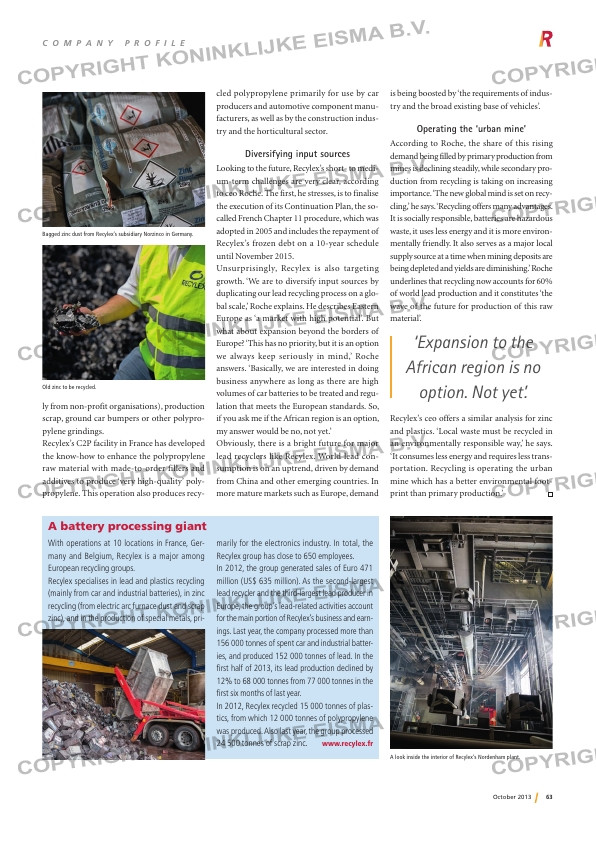Page 63 from: October 2013

63October 2013
C o m p a n y p r o f i l e
ly from non-profit organisations), production
scrap, ground car bumpers or other polypro-
pylene grindings.
Recylex’s C2P facility in France has developed
the know-how to enhance the polypropylene
raw material with made-to-order fillers and
additives to produce ‘very high-quality’ poly-
propylene. This operation also produces recy-
cled polypropylene primarily for use by car
producers and automotive component manu-
facturers, as well as by the construction indus-
try and the horticultural sector.
Diversifying input sources
Looking to the future, Recylex’s short- to medi-
um-term challenges are very clear, according
to ceo Roche. The first, he stresses, is to finalise
the execution of its Continuation Plan, the so-
called French Chapter 11 procedure, which was
adopted in 2005 and includes the repayment of
Recylex’s frozen debt on a 10-year schedule
until November 2015.
Unsurprisingly, Recylex is also targeting
growth. ‘We are to diversify input sources by
duplicating our lead recycling process on a glo-
bal scale,’ Roche explains. He describes Eastern
Europe as ‘a market with high potential’. But
what about expansion beyond the borders of
Europe? ‘This has no priority, but it is an option
we always keep seriously in mind,’ Roche
answers. ‘Basically, we are interested in doing
business anywhere as long as there are high
volumes of car batteries to be treated and regu-
lation that meets the European standards. So,
if you ask me if the African region is an option,
my answer would be no, not yet.’
Obviously, there is a bright future for major
lead recyclers like Recylex. World lead con-
sumption is on an uptrend, driven by demand
from China and other emerging countries. In
more mature markets such as Europe, demand
is being boosted by ‘the requirements of indus-
try and the broad existing base of vehicles’.
Operating the ‘urban mine’
According to Roche, the share of this rising
demand being filled by primary production from
mines is declining steadily, while secondary pro-
duction from recycling is taking on increasing
importance. ‘The new global mind is set on recy-
cling,’ he says. ‘Recycling offers many advantages.
It is socially responsible, batteries are hazardous
waste, it uses less energy and it is more environ-
mentally friendly. It also serves as a major local
supply source at a time when mining deposits are
being depleted and yields are diminishing.’ Roche
underlines that recycling now accounts for 60%
of world lead production and it constitutes ‘the
wave of the future for production of this raw
material’.
Recylex’s ceo offers a similar analysis for zinc
and plastics. ‘Local waste must be recycled in
an environmentally responsible way,’ he says.
‘It consumes less energy and requires less trans-
portation. Recycling is operating the urban
mine which has a better environmental foot-
print than primary production.’
‘Expansion to the
African region is no
option. Not yet’.
With operations at 10 locations in France, Ger-
many and Belgium, Recylex is a major among
European recycling groups.
Recylex specialises in lead and plastics recycling
(mainly from car and industrial batteries), in zinc
recycling (from electric arc furnace dust and scrap
zinc), and in the production of special metals, pri-
marily for the electronics industry. In total, the
Recylex group has close to 650 employees.
In 2012, the group generated sales of Euro 471
million (US$ 635 million). As the second-largest
lead recycler and the third-largest lead producer in
Europe, the group’s lead-related activities account
for the main portion of Recylex’s business and earn-
ings. Last year, the company processed more than
156 000 tonnes of spent car and industrial batter-
ies, and produced 152 000 tonnes of lead. In the
first half of 2013, its lead production declined by
12% to 68 000 tonnes from 77 000 tonnes in the
first six months of last year.
In 2012, Recylex recycled 15 000 tonnes of plas-
tics, from which 12 000 tonnes of polypropylene
was produced. Also last year, the group processed
24 500 tonnes of scrap zinc. www.recylex.fr
A look inside the interior of Recylex’s Nordenham plant.
A battery processing giant
Bagged zinc dust from Recylex’s subsidiary Norzinco in Germany.
Old zinc to be recycled.
p00_Recylex.indd 63 03-10-13 10:27



